|
|
|
Sort Order |
|
|
|
Items / Page
|
|
|
|
|
|
|
| Srl | Item |
| 1 |
ID:
136858


|
|
|
|
|
| Summary/Abstract |
In the shadow of one of Europe’s most sustained terrorist problems, Greece is entering a new era of radical left-wing politics. George Kassimeris explore the threat facing the country’s counter-terrorism agencies from the next generation of militant anarchists.
|
|
|
|
|
|
|
|
|
|
|
|
|
|
|
|
| 2 |
ID:
020384
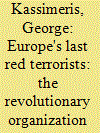

|
|
|
|
|
| Publication |
2001.
|
| Description |
67-84
|
|
|
|
|
|
|
|
|
|
|
|
|
|
|
|
| 3 |
ID:
119442
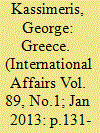

|
|
|
|
|
| Publication |
2013.
|
| Summary/Abstract |
Greece has one of the most sustained problems of political terrorism anywhere in the world. From the mid-1970s to the present, the country's political and socio-economic institutions have been confronted by systematic terrorist violence mainly at the hands of revolutionary guerrilla groups.
The long story of Greek terrorism was thought to have ended in the summer of 2002 with the collapse of the country's premier terrorist group and one of Europe's longest-running gangs, the notorious Revolutionary Organization 17 November (17N). 17N's dismantling and imprisonment, rather than demoralizing and emasculating the country's armed struggle movement, led instead to the emergence of new urban guerrilla groups and an increase and intensification of revolutionary violence.
In consequence, the article places Greek extremist violence in a broader political and cultural perspective and explains why it has become a permanent fixture of national public life.
|
|
|
|
|
|
|
|
|
|
|
|
|
|
|
|
| 4 |
ID:
181747
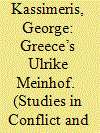

|
|
|
|
|
| Summary/Abstract |
Pola Roupa’s arrest in 2016 was the final nail in the coffin of Revolutionary Struggle, the first guerrilla group to emerge on Greece’s terrorist landscape after the 2002 collapse of 17 November, the country’s premier terrorist organisation for almost three decades and one of Europe’s longest-running terror gangs. Drawing on the judicial investigation findings, courtroom testimonies, RS communiqués and interviews with counter-terrorism officials, this article tells the story of Pola Roupa, the first female leader of a Greek terrorist group in an attempt to understand the political reasons and motivational factors that led to her involvement in terrorism. At the same time, the article hopefully contributes to the study and understanding of women and terrorism by providing an insight into the role and experience of a female militant inside Greece’s gender-conservative and overwhelmingly male-dominated armed struggle movement.
|
|
|
|
|
|
|
|
|
|
|
|
|
|
|
|
| 5 |
ID:
106606


|
|
|
|
|
| Publication |
2011.
|
| Summary/Abstract |
In the pages of this journal in 2005, the author argued that the dismantling of the Revolutionary Organization 17N did not equate to the final elimination of terrorism in Greece. European experience, it was further argued, had shown that when a major terrorist organization is broken up, after a period of time a new generation of terrorists emerges that tends to lack the operational capabilities and scope of the group they attempt to imitate, but this does not render them less dangerous. Tellingly, the Revolutionary Struggle (RS) picked up the baton of violence from 17N before the latter's trial had even come to an end. This article examines RS's campaign of violence, explains its selection of targets and compares the group's ideological physiognomy and operational development with that of the group it aspired to emulate.
|
|
|
|
|
|
|
|
|
|
|
|
|
|
|
|
| 6 |
ID:
115011
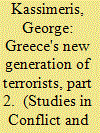

|
|
|
|
|
| Publication |
2012.
|
| Summary/Abstract |
On 2 November 2010, the Greek government took the unprecedented step of suspending international airmail for 48 hours after a wave of parcel bombs targeting the German Chancellor, Angela Merkel, the Italian premier Silvio Berlusconi, and the French President Nicholas Sarkozy as well as a number of foreign embassies in Greece and across Europe caused a major security scare. Responsibility for the parcel bombs campaign, which placed European counterterrorism authorities on high alert, was claimed by the Greek anarchist-oriented guerrilla group, Conspiracy of Cells of Fire (CCF). Since its emergence in 2008, CCF has become one of the most active of Greece's new generation of urban guerrilla groups. This article examines CCF's campaign of violence and explains its selection of targets and the nature of its organizational and operational development.
|
|
|
|
|
|
|
|
|
|
|
|
|
|
|
|
| 7 |
ID:
145824


|
|
|
|
|
| Summary/Abstract |
The collapse of Greece's premier terrorist organization, the 17 November (17N) group, back in the summer of 2002 was a truly dramatic event, considering 17N's 27-year career, but it was not such a watershed event in the country's history as it was presented at the time by the mainstream political and media establishments. 17N's dismantling and imprisonment, far from demoralizing and emasculating the armed struggle movement, led to the emergence of new urban guerrilla groups and the increase and intensification of revolutionary violence. This article reassesses Greece's persistent terrorism problem by focusing on the nature, threat, and operational evolution of a new generation of political militancy.
|
|
|
|
|
|
|
|
|
|
|
|
|
|
|
|
| 8 |
ID:
167907


|
|
|
|
|
| Summary/Abstract |
2019 marks 100 years since the birth of Andreas Papandreou, Greece's first socialist prime minister and an extraordinary figure of twentieth century European politics. Looking back, the central purpose of this article is to answer pivotal questions about Papandreou and his career. What have been the major turning points in his life? What were his main beliefs? What motivated him and his politics? What were his political priorities and methods? What did he want to achieve as prime minister? Why did he become so involved in foreign policy issues? What were his assets as prime minister? Did they outweigh his shortcomings as a politician and leader? Did power change him and how? What will be Papandreou's place in history?
|
|
|
|
|
|
|
|
|
|
|
|
|
|
|
|
| 9 |
ID:
068307


|
|
|
| 10 |
ID:
060838


|
|
|
|
|
| Publication |
Jan-Feb 2005.
|
| Summary/Abstract |
The end of Greece's Revolutionary Organization 17 November (17N) finally came on 5 September 2002 when the group's leader of operations, Dimitris Koufodinas, turned himself to the police. Unlike Alexandros Giotopoulos, the group's chief ideologue who denied any involvement in 17N, Koufodinas took responsibility for the entire 17N experience and sought to defend and justify their violent actions. Drawing on Koufodinas's court testimony this article suggests that the world of 17N was a closed, self-referential world where terrorism had become for the members a way of life from which they could not walk away. Defending the group's campaign from beginning to end, Koufodinas contended that 17N was an authentic revolutionary alternative to a barbaric, inhumane and vindictive capitalist order that was running amok. An emblematic personality of 17N terrorism, Dimitris Koufodinas embraced the view that Greece's “self-negating democracy” necessitated exactly the kind of political violence they had undertaken
|
|
|
|
|
|
|
|
|
|
|
|
|
|
|
|
| 11 |
ID:
075978
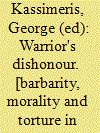

|
|
|
|
|
| Publication |
Aldershot, Ashgate Publishing Limited, 2006.
|
| Description |
ix, 243p.
|
| Standard Number |
0754647994
|
|
|
|
|
|
|
|
|
|
|
|
Copies: C:1/I:0,R:0,Q:0
Circulation
| Accession# | Call# | Current Location | Status | Policy | Location |
| 052193 | 303.66/KAS 052193 | Main | On Shelf | General | |
|
|
|
|
| 12 |
ID:
191536


|
|
|
|
|
| Summary/Abstract |
Bob Spencer served as senior investigating officer and a specialist senior investigating officer for terrorism for the West Midlands Police in the U.K. Almost immediately after the 7/7 attacks in London, he was made Head of Intelligence for the West Midlands CTU. West Midlands being assessed at the time to have had the highest terrorism threat in the U.K. outside the capital, Spencer was invited to head the delivery of the governments Prevent agenda within the Regional Counter Terrorism Unit, with responsibility for embedding the strategy across four regional forces. Spencer retired from the force in 2012 but continued to advise various organizations around their compliance with terrorism regulations and particularly their organizational security and preparedness. In June 2016, he was appointed the Prevent Coordinator for Walsall Council in the West Midlands, retiring from the role in 2019.
|
|
|
|
|
|
|
|
|
|
|
|
|
|
|
|
| 13 |
ID:
106570


|
|
|
|
|
| Publication |
2011.
|
| Summary/Abstract |
This article seeks to analyze the life histories of two former members, Patroklos Tselentis and Sotiris Kondylis, of the defunct terrorist group, the Greek Revolutionary Organization 17 November (1975-2002) in order to look for causes of disengagement, dissociation, and repentance. Analyzing the life histories of Patroklos Tselentis and Sotiris Kondylis offers valuable insights into the development of complex processes of involvement in and disengagement from 17 November terrorism. The detail stemming from their testimonies provides a more complete picture of the group's internal dynamics and challenges a range of simplistic stereotypes, not only about the individuals involved in terrorism but also about the ways in which they make decisions and reflect on their experiences of being part of a terrorist organization.
|
|
|
|
|
|
|
|
|
|
|
|
|
|
|
|
|
|
|
|
|